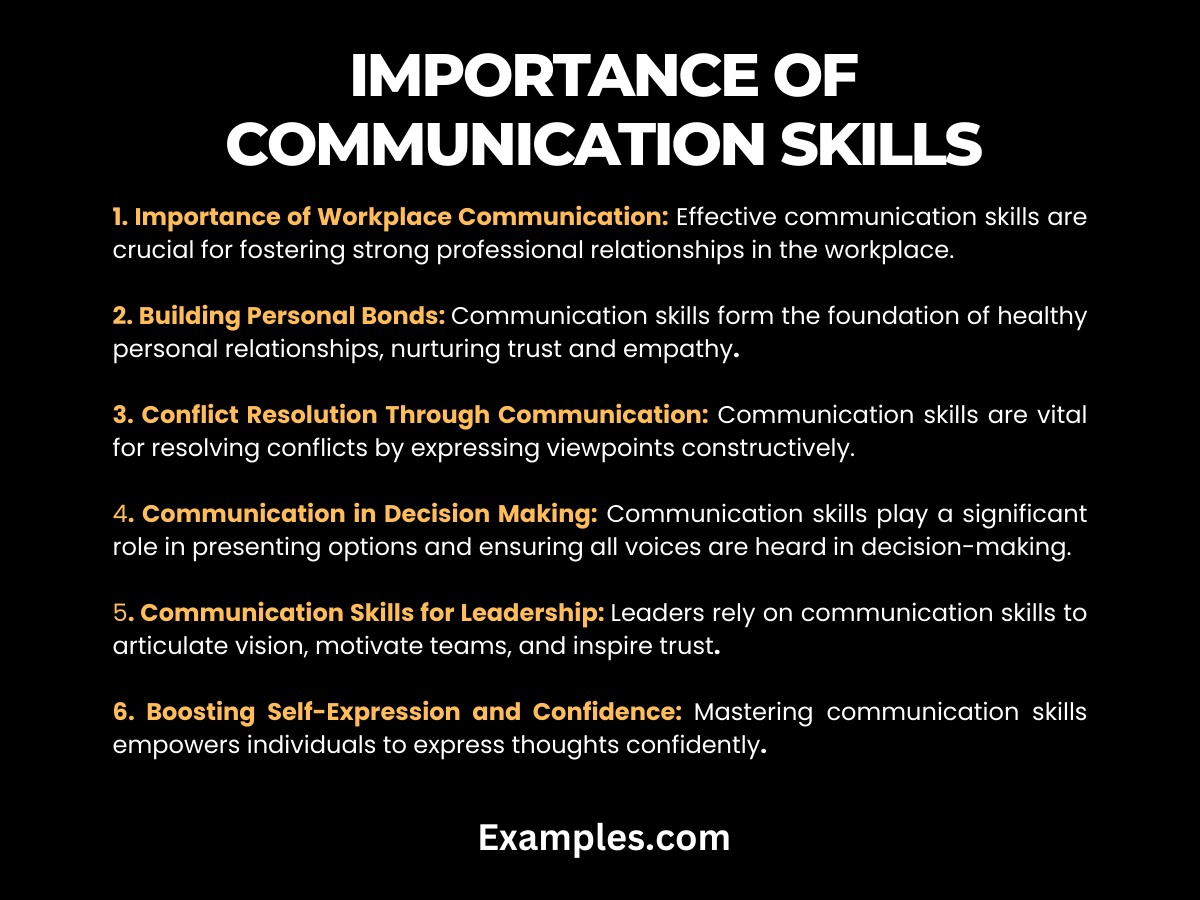Importance of Communication Skills – 7+ Examples, How to Improve
Importance of Communication Skills
Effective communication is a pivotal aspect in every sphere of life. Whether in personal relationships, professional settings, or casual encounters, the ability to convey thoughts, ideas, and feelings is paramount. Communication skills are not just about speaking or listening; they encompass understanding and being understood, creating a bridge of clarity and comprehension. In this context, we explore the profound importance of communication skills, highlighting their role in various aspects of our lives.

1. Enhancing Professional Relationships
In the workplace, communication skills are crucial for fostering strong professional relationships. They enable clear conveyance of ideas, ensuring that tasks are understood and executed effectively. Importance of communication skills in this realm can’t be overstated, as they are key to teamwork and collaboration, leading to a more harmonious and productive work environment.
2. Building Personal Relationships
On a personal level, communication skills are the foundation of healthy relationships. Whether with family, friends, or partners, the ability to communicate effectively deepens bonds and prevents misunderstandings. This aspect of communication skills is essential in nurturing trust, empathy, and strong emotional connections.
3. Aiding in Conflict Resolution
Conflicts are a natural part of human interactions. The importance of communication skills in resolving conflicts is vital. They help in expressing viewpoints constructively, understanding the perspective of others, and finding common ground. Effective communication can transform conflicts into opportunities for growth and understanding.
4. Facilitating Decision Making
Communication skills play a significant role in decision-making processes. They allow for the clear presentation of options and implications, ensuring that all voices are heard and considered. This aspect of communication skills is crucial in both personal and professional settings for making informed, collaborative decisions.

5. Enhancing Leadership Abilities
For leaders, communication skills are indispensable. They enable leaders to articulate their vision, motivate their team, and foster a sense of community and purpose. The importance of communication skills in leadership also lies in the ability to provide constructive feedback and inspire trust.
6. Promoting Self-Expression and Confidence
Effective communication boosts self-expression and confidence. By mastering communication skills, individuals feel more empowered to express their thoughts and opinions, leading to greater self-assurance and assertiveness in various life situations.
7. Improving Educational Outcomes
In educational settings, communication skills are critical for both teachers and students. They enhance teaching methodologies and learning experiences, leading to better comprehension and academic performance. The importance of communication skills in education cannot be understated, as they are fundamental to knowledge acquisition and dissemination.
8. Nurturing Career Growth
In the career domain, communication skills are often a key determinant of success. From acing job interviews to networking and presenting ideas, effective communication can open doors to numerous opportunities and career advancements, highlighting the importance of communication skills in professional growth.
Importance of Communication Skills for Students
In the ever-evolving landscape of education and career advancement, communication skills have emerged as a cornerstone for student success. Whether it’s in the classroom, during group projects, or in preparing for future careers, the ability to communicate effectively is indispensable. This article delves into the importance of communication skills for students, highlighting how these skills not only enhance academic performance but also pave the way for a flourishing professional life.
- Enhanced Academic Performance: Students with strong communication skills often find it easier to comprehend complex concepts and articulate their understanding. This skill is crucial for both written assignments and verbal presentations, leading to better grades and academic recognition.
- Improved Group Work: Group projects are a staple in educational settings. Students who excel in communication can lead, collaborate, and resolve conflicts more effectively, ensuring a harmonious and productive group dynamic.

- Increased Confidence: Mastery in communication skills boosts a student’s confidence. This self-assurance is vital in classroom discussions, public speaking, and in expressing their ideas clearly and confidently.
- Career Readiness: As students transition into the workforce, communication skills become even more vital. Employers consistently rank good communication as a top soft skill, making it crucial for career development and success.
- Better Networking Abilities: Networking is key in today’s interconnected world. Students with strong communication skills can build and maintain professional relationships, opening doors to numerous opportunities and career advancements.
- Enhanced Problem-Solving Abilities: Effective communication is closely linked to problem-solving. Students who can articulate problems and brainstorm solutions collaboratively stand out in both academic and professional settings.
- Improved Leadership Skills: Many leadership roles require excellent communication skills. Students who hone these skills early are well-prepared to take on leadership positions in various aspects of their life.
- Cultural Sensitivity and Awareness: With communication skills, students learn to navigate and appreciate diverse perspectives, fostering an environment of inclusivity and mutual respect in multicultural settings.
Benefits of Communication Skills
Communication skills are a fundamental aspect of human interaction. Their importance transcends personal relationships, touching every facet of professional and social life. This section highlights the myriad benefits of good communication skills, demonstrating how they are instrumental in achieving personal and professional success.
- Stronger Relationships: Effective communication is the foundation of healthy relationships. Whether it’s in a personal, professional, or educational context, good communication skills facilitate understanding and mutual respect.
- Career Advancement: In the professional world, communication skills are often the key differentiator in career growth. Effective communicators are more likely to be noticed and considered for promotions and leadership roles.
- Effective Conflict Resolution: Communication skills are essential in resolving misunderstandings and conflicts. They enable individuals to express their viewpoints constructively and find amicable solutions.
- Enhanced Team Collaboration: In any team setting, communication skills ensure that ideas, strategies, and feedback are shared efficiently, leading to better collaboration and project success.
- Personal Development: Regular practice and improvement of communication skills contribute significantly to personal growth. They help in developing empathy, listening abilities, and emotional intelligence.
- Better Decision Making: Effective communication involves gathering information, discussing options, and reaching consensus. These skills are crucial for sound decision-making in both personal and professional contexts.
- Increased Influence: People with strong communication skills have the ability to influence others. This skill is invaluable in leadership, negotiation, and in driving change.
- Improved Public Speaking: Public speaking is an essential aspect of communication. Mastering this skill can lead to numerous opportunities in professional, academic, and social settings.
Good Communication Skills for a Great Career

In today’s competitive work environment, good communication skills are indispensable. They not only facilitate seamless operations but also enhance interpersonal relationships and career growth. This comprehensive guide delves into the significance and development of these skills for a successful career.
- Essentiality in Teamwork:
Collaboration in communication skills is crucial in a team setting. Good communicators foster a collaborative atmosphere, making team projects more efficient and effective. - Leadership and Influence:
Communication skills of a leader play a vital role. Effective leaders use these skills to motivate their teams, set clear goals, and create a positive work culture. - Career Advancement:
Individuals with strong communication skills often find it easier to navigate career advancements. These skills are key in interviews, networking, and presentations. - Building Professional Relationships:
Communication skills in relationships at work are vital. They help in building trust and understanding, which are foundational for professional growth. - Conflict Resolution:
The importance of conflict resolution in communication skills cannot be overstated. Good communicators are adept at managing and resolving workplace conflicts constructively. - Enhancing Customer Relations:
For those in customer-facing roles, communication skills are essential in understanding and meeting customer needs effectively. - Adaptability to Change:
Communication skills for workplace success include the ability to communicate changes and adapt messages according to the audience’s needs. - Feedback Reception and Delivery:
Feedback in communication skills is vital for personal and professional growth. It involves both giving and receiving constructive feedback.
Why is Effective Communication Important in the Workplace?
Effective communication is the cornerstone of a productive workplace. It ensures clarity, efficiency, and harmony among employees. This section explores its pivotal role.
- Preventing Misunderstandings:
Good communication skills help in reducing misunderstandings and errors in the workplace, ensuring smooth operation of tasks. - Enhancing Productivity:
When communication is clear, tasks are accomplished more efficiently, leading to increased productivity and better time management. - Fostering a Positive Work Environment:
Effective communication contributes to a positive atmosphere, making the workplace more enjoyable and motivating. - Encouraging Innovation:
Collaboration in communication skills paves the way for creative ideas and innovation by facilitating open discussions. - Building Trust and Transparency:
Transparent communication helps in building trust among team members and management, which is crucial for a healthy work environment. - Effective Decision Making:
Good communicators can convey and receive information clearly, aiding in more informed and effective decision-making. - Enhancing Employee Engagement:
Communication skills in leadership play a significant role in engaging employees, making them feel valued and heard. - Crisis Management:
In times of crisis, effective communication is key to managing the situation calmly and efficiently.
How to Improve Your Communication Skills
Improving communication skills is a continual process that benefits both personal and professional life. This guide provides practical tips to enhance these skills.
- Active Listening:
Active listening communication skills involve paying full attention to the speaker, understanding their message, and responding thoughtfully. - Clarity and Conciseness:
Clear and concise communication prevents misunderstandings. It’s essential to be straightforward and to the point. - Non-Verbal Communication:
Understanding and using body language effectively can greatly improve communication skills. - Empathy and Understanding:
Empathy in communication skills helps in understanding others’ perspectives, leading to more effective interactions. - Regular Practice:
Like any other skill, communication skills improve with regular practice. Engage in conversations, presentations, and public speaking. - Feedback Reception:
Being open to communication skills feedback helps in identifying areas for improvement. - Continuous Learning:
Engage in communication skills training and educational resources to stay updated and refine your skills. - Technological Adaptability:
In the digital age, being adept at various forms of communication technology is essential.
In today’s world, effective communication skills are more than just a necessity; they are a cornerstone for success in all aspects of life. This guide has highlighted the importance of these skills in the workplace, offered insights into their critical role, and provided actionable tips to improve them. Embracing these skills can lead to profound personal and professional growth, making them an invaluable asset for anyone looking to succeed.
In a globalized world, communication transcends geographical and cultural boundaries. Understanding and respecting cultural differences in communication is paramount for effective global interactions. This is particularly crucial in multicultural workplaces, international business, and cross-cultural exchanges. The United Nations Educational, Scientific and Cultural Organization (UNESCO) offers valuable resources on promoting intercultural dialogue and understanding through communication. By embracing a global perspective, individuals and organizations can foster a more inclusive and effective communication environment, enriching both personal and professional interactions.



